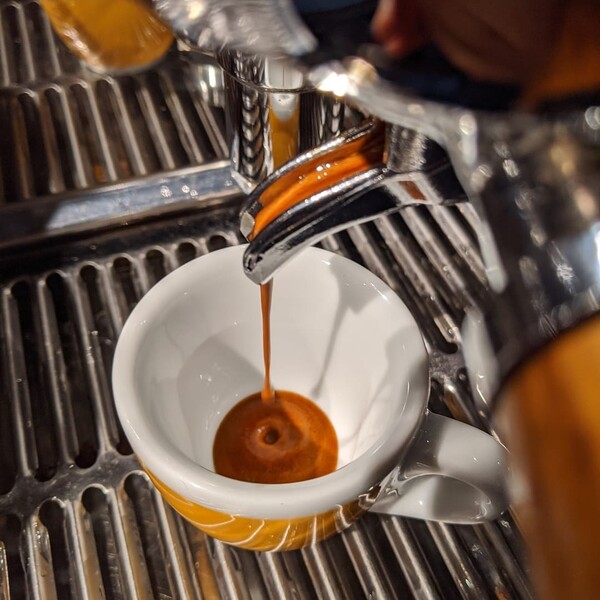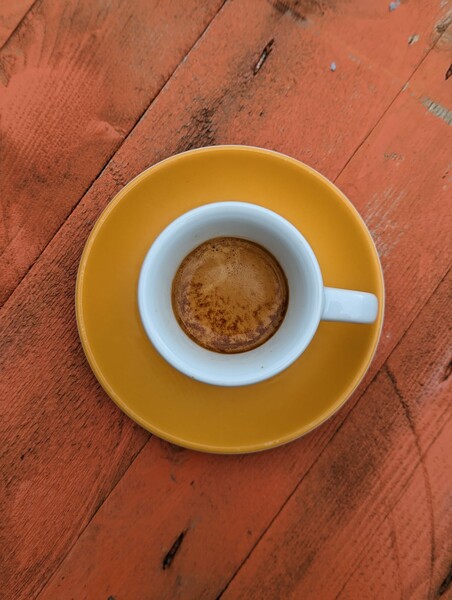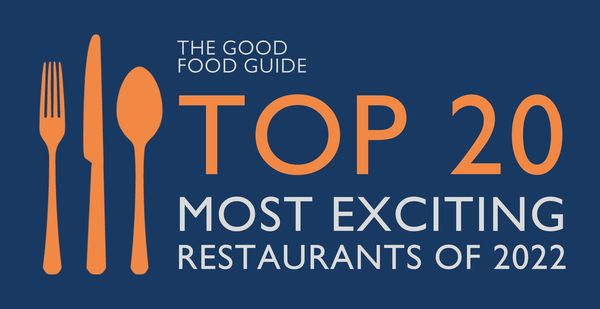Our winner of Best Local Restaurant in the North West this year is a homely little Italian trattoria, tucked away in an unlikely corner of a Prestwich industrial estate. Since opening in 2014, owner, baker and barista Nico Pasquali has been delivering faultlessly authentic and delicious flavours of Italy, to a famously uncompromising standard. Read on for his unbreakable rules on coffee and carbonara.
Nico Pasquali has morphed into his own urban myth, a local legend as a man who sticks to his principles. Even once you navigate your way to Lupo, the small Italian cafe-cum-cafeteria bizarrely located on an industrial trading estate in north Manchester, be warned. Don’t ask for a flat white, however enticing the aroma of freshly ground coffee beans. Nico, a lanky, engaging Roman transplant to Prestwich is likely to give you short shrift. In the most charming and idiosyncratic way (of course) he’s likely to tell you to take your business elsewhere.

In self-referential mockery, the flat white injunction now adorns a cartoon printed on a house t-shirt. Just as the renowned French chef Nico Ladenis once banished salt and pepper from his tables, so his namesake won’t serve you something he considers non-Italian. As he explains, ‘I try and replicate a true feel of Italy here, and only serve espresso. As in Italy, drinking coffee should be a small ritual of everyday life, one in which you appreciate its essence and aroma. When you have a coffee, an espresso, it’s about taking a beat to relax and enjoy the moment.’
Lupo refers to an Italian expression, bocca di lupo broadly meaning ‘you should stick your head in the wolf’s mouth and not get it bitten off.’ A lupine mask on the wall underlines the reference, and indeed it takes a certain chutzpah (if not always heeded) to advise customers not to drink cappuccino after lunch ‘not just because it’s not the custom in Italy, but because it’s not healthy.’ He explains that pasta or other dishes with rich sauces followed by a milky drink only emphasise indigestion and sleepiness.
‘In England so much has been dominated by American influence. Everything has to be big. That’s wrong. Big does not always mean better – and that applies to coffee. Double or treble shots have become popular but there is no need to increase the amount or strength to get the best experience. The highest supermarket grades are made with cheaper Robusta beans rather than Arabica, but they have less flavour and a lot more caffeine than you need. As a result, I’ve noticed many people have stopped drinking coffee altogether.’

Nico first came to the UK to learn English and decided he loved the country enough to stay. ‘England offered me opportunities, when it’s not easy to believe in yourself.’ For over 20 years, he has studied coffee extensively, has run barista and tasting classes, and has worked in coffee plantations abroad. ‘I started as an independent consultant in London and would go into coffee shops carrying a mafioso-style violin case with my tools inside and tell the owners their coffee was no good and how to fix it. It took some balls to do that!’
Growing up he was in charge of making the family mocha Bialetti coffee each morning (though he was too young to actually drink it – as the old expression goes, ‘Liquor, coffee and wine will kill babies!’ It’s a process he believes is still one of the best with environmentally friendly extraction methods. And, as all Italians know, it’s a pot never to be washed with soap or put in the dishwasher at pain of excommunication.
The stove-top pot also brings a glorious aroma you never get from super-ritzy home machines. ‘That’s less a problem than the fact many of these expensive machines actually cut corners and plastic pods create problems. People think they are quick and easy but they are money-making, marketing-based products – and people still make terrible coffee! There’s one particular commercial machine we call in the trade the ‘Coffee Cancer’ that’s been hugely popular but it’s a scam. Too many people are seduced by flashy looks.’

There are several tell-tale signs of a poor coffee shop or bar according to Nico. ‘Many don’t ‘purge’ the coffee from the machine or leave it greasy because they’ve skimped on cleaning. Also check the milk steamer: if it looks white or brownish, then it’s not been cleaned properly either. And the milk needs to be at the correct temperature: if it’s too hot, then the sugar and fats burn and you cannot digest the coffee properly. The grind setting of the coffee is also very important – the barista needs to check daily as it can actually be affected by the weather. Coffee that has been roasted and ground needs to be used quickly or oxygen will affect its properties, no more than two or three weeks after roasting.’
The variety and processing of beans is also important. ‘Washed’ give a bright and acidic taste; ‘natural’ a more rounded flavour. Country of origin and extent of roasting – neither too light nor too dark – are also players in the complex, multi-dimensional process of producing an excellent brew. Nico has his own blend blended and roasted in the UK to his own specifications. On the question of sugar he advises white sugar only, as ‘brown alters the flavour.’ And he destroys another coffee myth when he says it’s a mistake to think sprinkled sugar should float on the crema (the foam on a freshly pulled shot). And if the crucial layer is too thick then ‘it’s a sign of poor quality. On the other hand, if there’s no crema, then don’t drink it!’
Some accuse Nico of being too dictatorial but he replies, ‘I want to be a host and a friend and if someone comes here and disrespects my rules it’s like insulting my home.’ It’s an attitude that carries over to the delicious food which is made to equally exacting standards. When one customer asked for pasta with tomato sauce to be served separately, she was simply told ‘No’. Another foolish soul, when ordering a superb, hand-crafted pizza produced some commercial dips, was equally dissuaded.
At Lupo, the customer may not always be right but they’ll always have a great cup of coffee.








